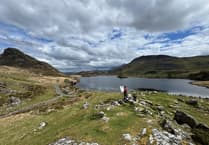To reduce the risk of spreading the disease trichomonosis among the hawfinch population around Dolgellau, RSPB Cymru and BTO Cymru are calling on householders to stop feeding birds in Meirionnydd for the remainder of the summer, and to stop providing water for birds at any time in this region.
This area includes the towns of Blaenau Ffestiniog, Y Bala, Penrhyndeudraeth and Barmouth/Abermaw.
The hawfinch is a scarce and localised woodland breeding bird that is attracted to sunflower seeds provided in gardens. The area around Dolgellau holds one of the five most important populations of hawfinch in the UK and is one of the two principal breeding areas in Wales.
David Smith, RSPB Cymru senior conservation officer, said: “We’re extremely concerned about the spread of this deadly disease among the hawfinch population near Dolgellau. That’s why we’re asking for people living in Meirionnydd to cease providing food and water for birds for the remainder of the summer, which will cause birds to disperse across the countryside where they are less prone to transmitting disease.”
Despite the dry weather, there is plenty of natural food and fresh water in the Meirionnydd area during the summer. Householders are asked not to provide drinking or bathing water for birds to reduce the risk to hawfinch’s survival in this region of Wales.
Mr Smith added: “This will help to stop the spread of trichomonosis and will protect a rare and vulnerable bird. While we’re specifically only asking for people living in Meirionnydd to stop feeding altogether, it’s vitally important for anyone who’s feeding birds in their gardens to clean their bird feeders regularly to avoid the spread of this disease and other infections. Providing water for birds is unnecessary in this part of Wales and removing bird baths may reduce the risk of disease transmission.”
People have been reporting sick and dead hawfinches in gardens throughout spring and summer in the Dolgellau area, making it the worst year since studies of hawfinches began 10 years ago. Trichomonosis is the primary cause of a 79 per cent decline in greenfinch in Wales over the last 10 years, and a 38 per cent decline in chaffinch, so a similar decline could be catastrophic for the hawfinch population.
Kelvin Jones, BTO Cymru development officer, said: “Trichomonosis is a disease that normally affects birds which feed on spilt grain from bird tables and feeders. The symptoms include general illness like lethargy and fluffed-up plumage, and can cause birds to drool saliva, regurgitate food, and have difficulty in swallowing breathing. The disease may progress over several days or weeks, consequently affected birds die. It’s a nasty and unpleasant disease that poses a risk to rare birds, therefore we must do all we can to stop further harm.”



.jpeg?width=209&height=140&crop=209:145,smart&quality=75)

Comments
This article has no comments yet. Be the first to leave a comment.